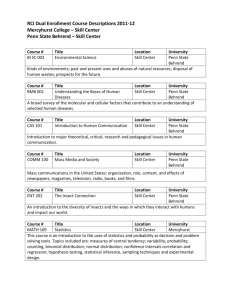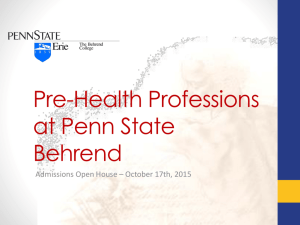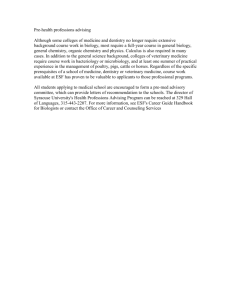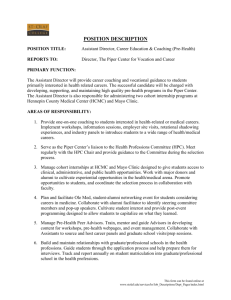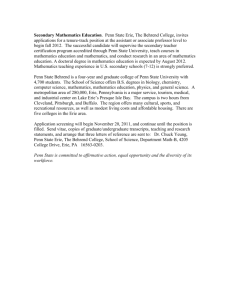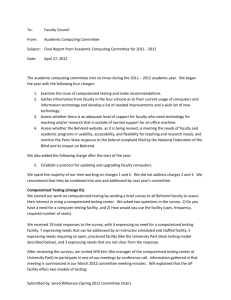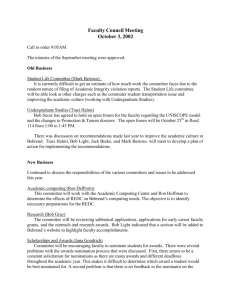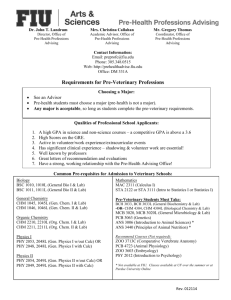PREMED ADVISING
advertisement
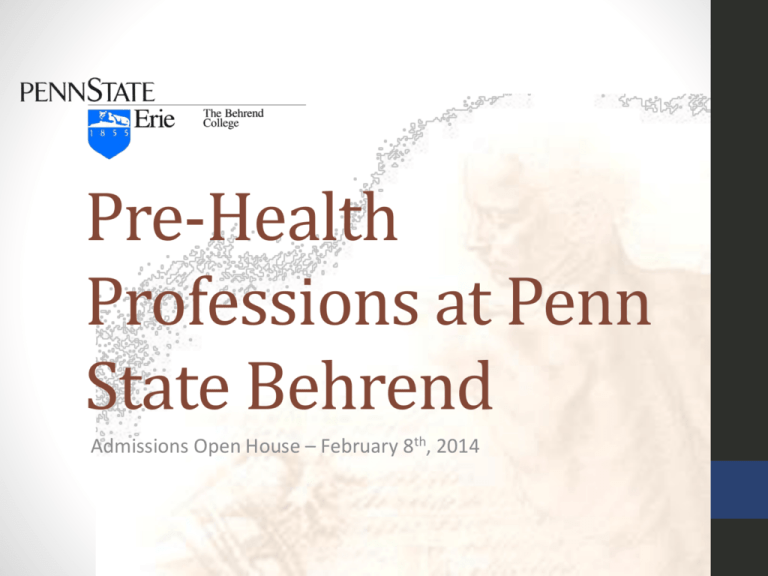
Pre-Health Professions at Penn State Behrend Admissions Open House – February 8th, 2014 What Are Health Professions Schools Looking For? Ultimately, admissions committees want to know 3 things: 1. Can the student handle the academic rigors of medical school? 2. Why does the student want to be a doctor or health practitioner… …do they want to be in the profession for the “right” reasons? 3. Do they have a diverse set of skills necessary to be a good doctor or health practitioner? How can Penn State Behrend help the student succeed? Preparing the Student Academically Although each health professions program is slightly different, in general they require: • Biology: a general biology core along with upper level courses in genetics, cell biology and physiology and laboratories • Chemistry: 4 semesters of general and organic chemistry and the laboratories • Physics: 2 semesters of physics • Biochemistry: 1-2 semesters – MCAT2015 • Psychology/sociology: 1-2 semesters – MCAT2015 • Math: 2 semesters, usually calculus and statistics Preparing the Student Academically At Penn State Behrend we offer rigorous that fulfill these requirements – strength of application! The Pre-Health Professions Option in Biology is the most specialized towards these goals. Students can major in chemistry, physics or engineering! • They work closely with their health professions advisor to add the necessary biology courses to their degree requirements • In almost all cases leads to a biology minor Preparing the Student Academically …but other colleges/universities offer a specific “Pre-Med Degree”. Why not Penn State Behrend? • No health professions school requires or favors this ‘degree’ • Pre-medical degrees are a marketing tool and are a repackaged biology degree in most cases • We urge you to compare the course lists between these pre-medical degrees and our biology degree versus the requirements of any health professions program! Preparing the Student Academically Most importantly: We advise all of our pre-health students, whether they have a 2.8 or 4.0 GPA to have a “Back-up Plan” in case they change their minds about a career in the health professions or they do not make it into their program. A rigorous Penn State degree in biology or chemistry leads to many highly engaging, intellectual careers related to the health sciences: Synthetic chemist, molecular biologist, virologist, biochemist, geneticist, genetic engineer, microbiologist, health physicist, environmental chemist, epidemiologist….to name just a few! Preparing the Student Academically Penn State Behrend is one of the few schools that combines the best qualities of a large research university and a small liberal arts college: Our professors are active researchers in their respective fields who publish cutting edge research in the current scientific literature Our students receive hands-on training to cutting edge research equipment not found at smaller schools. Many of our students become involved in undergraduate research projects and present their work to the scientific community both through presentation and publication. Preparing the Student Academically However, unlike a larger research school our professors spend considerable time in the classroom including laboratories. Small class sizes result in us getting to know our students and to provide quick and early intervention if we feel they are not learning the material. Many of our instructors are dedicated lecturers whose ‘research’ is actually in developing new teaching methods. These individuals commit time and effort in engaging students in the study of the sciences both on campus and in outreach activities. Preparing the Student Academically - Our track record: Students to Pre-Health Professions Averages Behrend students who were accepted to medical school in the last seven years: • 3.63 science & math GPA • 3.64 overall GPA • 30 MCAT 5.7% Pharmacy 4.3% Veterinary 3.8% Physician Assistant 4.3% Medical (Ostepath) 2.4% Medical (Allopath) 2.9% Chiropractic 2.9% Physical Therapy 1.4% Occupational Therapy 1% Optometry 1% Podiatry 0.5% Dental ~30% Biology Graduates What Are Health Professions Schools Looking For? Ultimately, admissions committees want to know 3 things: 1. Can the student handle the academic rigors of medical school? 2. Why does the student want to be a doctor or health practitioner… …do they want to be in the profession for the “right” reasons? 3. Do they have a diverse set of skills necessary to be a good doctor or health practitioner? How can Penn State Behrend help the student succeed? Advising the Pre-Health Professions Student Pre-Health Professions Committee Coordinator Dr. Michael W. Justik – Associate Professor of Chemistry Member of the National Association of Advisors for the Health Professions (NAAHP) Dr. Beth Potter– Assistant Professor of Biology Dr. Matthew Gruwell – Assistant Professor of Biology Dr. Tia Deas – Lecturer of Biology Dr. Victoria A. Kazmerski - Associate Professor of Psychology, Physiological Psychology Our advisers teach and mentor our pre-health students— — not just advise! Student Timeline Freshmen • A census of Pre-Health students is made • “Planning Guides” are distributed to all pre-health students with contact information for a specific prehealth advisor • “Checking in e-mails” are sent from committee by discipline • Instructions as to scheduling of SC 201 Student Timeline Student Timeline Sophomore • SC201 – Fall • Health career opportunities and admissions committee expectations are discussed • Personal statements, interviews and standardized tests • Seminars from local health care practitioners and health professions recruiters • Back-up plan – what if you don’t get in? Student Timeline Sophomore • Spring Apply for pre-health advisor (with declaring major) • GPA requirement • Personal statement draft • Evidence of shadowing and volunteer experiences • Written statement of back-up plan Student Timeline Junior/Senior • Scheduled meetings with advisees • Personal statement draft discussed • Plan for application process • Plan for standardized tests discussed • Back-up plan discussed • Academic advising Advisor constructs committee letter from LORs and Personal Statement Student Timeline Post-Baccalaureate • Continued assistance for 2nd and 3rd round applications • Census of matriculated students to gauge success of our programs! Student Timeline AN ALTERNATIVE TIMELINE is now encouraged by many health professions programs • A year off between undergraduate and medical school • Post- baccalaureate programs – increase the breadth and depth of admissions requirements • Strengthen the application through: • Working in a medical field, Teach For America, MPH, Research, Volunteer work, and travel abroad • Have a full undergraduate degree in preparation for MCAT, DAT, PCAT, VCAT, etc. Advising the Pre-Health Professions Student The Pre-Health Professions Committee: •Works with the student on an individual basis and tailors their advising to the students career goals •Can provide early intervention in case of academic or other difficulty •Suggests health professions schools that ‘match’ the student •Assists the student with the application process • Collecting letters of recommendation • Writing of a summary letter • Scheduling of courses to be prepared for standardized tests •For all students a “Back-up Plan” is prepared just in case plans change! Advising the Pre-Health Professions Student The Pre-Health Professions Committee: • Provides assistance with the writing of the personal statement. • Works with student organizations to set up tours of local health professions schools, invite speakers and provide volunteer event opportunities • Works with fellow faculty and administration to ensure that our Pre-Health programs are at the forefront of meeting the requirements of health professions schools and standardized tests. Advising the Pre-Health Professions Student We recommend to the student: • Get to know faculty by active participation in lab and lecture, lab assisting, doing research, some sort of thesis, etc. • Clinical experience • Become a fan of your health profession! Show your dedication! Shadow, shadow, shadow, volunteer, volunteer and volunteer!!! • “Set yourself apart”: • Specialty area of study: computational science, medical humanities, neuroscience program • Study abroad • Fluency in a language like Spanish or Mandarin • Research experience • “Leadership” and service to the community Depth of experience is better than creating a long laundry list!!! Student Organizations The Behrend Scrubs’ Club • Open to all students • Volunteer work through Habitat for Humanity and TOPSoccer • Speaker series The American Medical Students Association • Chapter started in 2012 • Tour of Hershey Medical School • Same organization as students in medical school Accelerated Programs Penn State Behrend has agreements with several health professions schools to provide accelerated programs for gifted students Accelerated Programs 3+4 Accelerated Program in Primary Care - LECOM • Phase I - Penn State Behrend • SAT combined math and verbal score of 1200 • High school GPA of 3.5 and high school rank in top 25% of class; • Interview conducted on the Penn State Behrend campus. • Maintain a 3.3 GPA at Behrend, MCAT >24 • Phase II - LECOM • LECOM Secondary Application must be completed prior to scheduling an admissions interview. Letters of recommendation and supporting documentation must be submitted for LECOM review. Accelerated Programs 3+4 Accelerated Program in Dentistry – Temple University • Phase I - Penn State Behrend • SAT combined math and verbal score of 1200 • High school GPA of 3.5 and high school rank in top 25% of class; • An interview conducted on the Penn State Behrend campus. • Behrend GPA (science) >3.3 and >18 DAT • Phase II - Temple University • Final acceptance of candidates to Phase II of the program will be determined by Temple University. Students must apply through the AADSAS to Temple during the fall of their third year. Letters of recommendation and supporting documentation must be submitted for Temple review by the first day of January. Accelerated Programs 3+4 Accelerated Program in Dentistry – University of Buffalo •Phase I - Penn State Behrend • • • • SAT combined math and verbal score of 1200 High school GPA of 3.5 and high school rank in top 25% of class; An interview conducted on the Penn State Behrend campus. Behrend GPA >3.5 (science) and PCAT >400 average •Phase II - University at Buffalo • University at Buffalo may also require a formal interview with a designated interviewer as part of the admission process. • Receive a favorable letter of recommendation from the Penn State Behrend Health and Allied Health Professions Committee. Accelerated Programs 3+4 Accelerated Program in Optometry – Ohio State University •Phase I - Penn State Behrend • • • • SAT combined math and verbal score of 1200 High school GPA of 3.5 and high school rank in top 25% of class; An interview conducted on the Penn State Behrend campus. Penn State Behrend GPA > 3.5; OAT >320 (at least 300 in each cat.) •Phase II - Ohio State University • An automatic invitation to interview at the College of Optometry will be granted if the student participating in the Accelerated Program meets the following criteria while attending Penn State Behrend: • Observed at least two optometric practices. • Received a favorable letter of recommendation from the Penn State Behrend Health and Allied Health Professions Advisor. Accelerated Programs • While not an accelerate program, Our Early Assurance Program with the Penn State College of Medicine gives outstanding 2nd year Behrend students the opportunity to apply for provisional early acceptance to Penn State's College of Medicine in Hershey. Program Requirements • SAT > 1300, GPA > 3.6 at the end of the sophomore year, and completion of required courses. • Must demonstrate high academic achievement and Extracurricular activities and student involvement in human service experiences • A typed statement of 300 to 500 words describing significant past experiences, personal interests, motivation for pursuing a career in medicine, and plans for the future followed by review of Penn State Hershey Medical School What can you do? • Start the student investigating their health professions graduate programs NOW to see the requirements so they can make the most informed decision on an UG program • Review the admissions requirements so the student has an expectation to do well their freshman year • Most programs now require 100+ hours of patient contact experience to apply – start now What can you do? Consider PSB as a preferred destination! • All the research facilities of a large university…. • …but small class sizes! • Hands-on use of all research equipment • Personalized advising by professors for pre-health • We are highly regarded by admissions committees. • Accelerated programs for students you identify as being gifted and destined to a career path. Thanks for Listening! Questions? Feel free to contact us at any time if you have questions later! justik@psu.edu behrendprehealth@psu.edu
